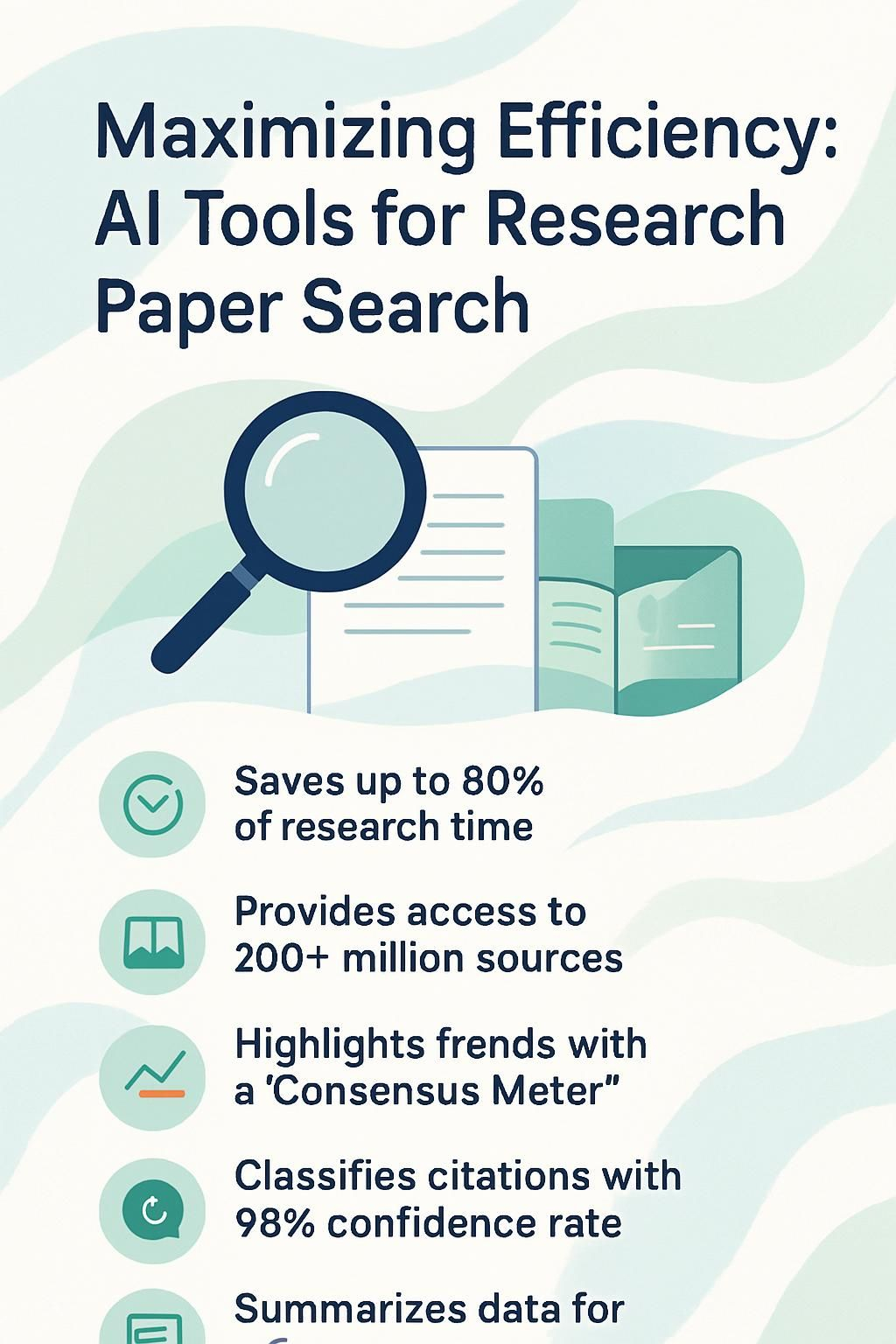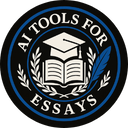Searching for research papers can feel overwhelming. With millions of studies out there, finding the right ones takes time and effort. AI tools for research paper search make this process faster and smarter.
Keep reading to learn how these tools can save you hours!
Key Takeaways
- AI tools like Elicit, Consensus, and Scite simplify research by scanning millions of papers quickly.
- Elicit saves up to 80% of research time and offers free access to 20 papers monthly or advanced plans for more use.
- Consensus provides study snapshots, filters, and a “Consensus Meter” to highlight trends in over 200 million academic sources.
- Scite’s Smart Citations classify references as supporting, contrasting, or neutral with a 93% confidence rate for validation.
- These AI tools boost productivity by summarizing data accurately and speeding up literature reviews efficiently.

Popular AI Tools for Research Paper Search
AI tools make finding research papers faster and easier. These tools help uncover relevant studies with just a few clicks.
Elicit: AI Research Assistant
Elicit helps researchers save time by streamlining literature searches. It scans a database of 125 million academic papers sourced from Semantic Scholar. Users can quickly find relevant studies for systematic reviews or research productivity tasks.
The tool reduces research time by up to 80%. Free users can extract data from 20 papers monthly, while paid plans offer more access. For $10/month (billed yearly), the Plus Plan allows extraction from 600 papers annually.
Pro and Team Plans let users process thousands of documents each year, making work faster and efficient.
Consensus: AI-powered Academic Search Engine
Consensus simplifies academic searches with machine intelligence. It offers access to over 200 million research papers across various fields. Over 2 million users, including students and researchers, use it globally.
More than 5,000 universities trust this tool for managing literature review needs. Advanced language models like OpenAI’s LLMs power its insights.
Key features include Search Filters, Paper-Level Insights, and the Consensus Meter for quick data checks. The “Ask Paper” Beta lets users interact directly with full-text PDFs to get detailed answers fast.
Its Study Snapshot quickly summarizes findings from systematic reviews or experiments. Options like Pro Analysis enhance research productivity by identifying trends in theses or cardiovascular health trials efficiently.
Consensus redefines how academics conduct literature searches, offering quality filters paired with robust study summaries.
Semantic Scholar: AI-Powered Research Tool
Semantic Scholar boosts research productivity with smart AI features. This tool offers access to over 200 million research papers. Filters and proprietary search tools help users find relevant papers fast.
Its Pro Analysis and Consensus Meter simplify evaluating reliable studies.
Over 2 million people use Semantic Scholar, including researchers, students, and clinicians. The “Ask Paper” feature provides detailed insights from full-text PDFs using Language Learning Models (LLMs).
Constant updates improve accuracy in extracting data for systematic literature reviews or citation management.
Scite: Citation Analysis and Validation Tool
Scite helps researchers find and validate citations efficiently. It has access to 200 million sources and organizes 1.2 billion citations. Its Smart Citations show whether a reference supports, contrasts, or remains neutral toward the research.
Over 1.74 million users worldwide rely on its tools.
It offers advanced features like citation statement search, a reference checker, and journal dashboards for tracking publication trends or top authors in specific fields. Funded by NSF and NIDA, Scite guarantees reliable results with a 93% confidence rate for citation context analysis.
New users can try it free for seven days!
Key Features of AI Tools for Research Efficiency
These AI tools help simplify literature reviews and speed up finding relevant papers—explore their full potential next!
Summarizing and extracting data from papers
AI tools like Elicit and Consensus make data extraction faster. Elicit processes up to 3,600 research papers monthly, depending on the plan. It helps identify key insights from large datasets for a systematic literature review.
Consensus simplifies academic search by offering study snapshots that summarize population, methods, and sample size quickly.
Scite also excels at summarizing findings from relevant papers with high accuracy. Its 93% confidence metric ensures citation contexts are reliable for reference management. These tools reduce time spent scanning abstracts or full texts during literature searches while improving research productivity.
Instant access to millions of academic papers
Elicit taps into a database of 125 million academic papers. Consensus, an AI-powered search engine, offers access to more than 200 million research articles. Scite provides over 200 million sources and classifies 1.2 billion citations for easy use.
These tools make literature searches fast and efficient. They help researchers find relevant papers in seconds without sifting through countless files or outdated platforms like Google Scholar.
Automated citation generation and validation
Scite simplifies citation work. It provides Smart Citations that classify references as supporting, contrasting, or neutral. This saves time and improves research accuracy. Its tools, like the reference checker, ensure citations are correct and reliable.
Researchers can also use Scite’s citation statement search to find specific insights in seconds. With access to millions of academic papers, this AI-powered tool boosts efficiency during literature searches and systematic reviews.
Advantages of Using AI Tools for Research
AI tools speed up your search process and make finding research papers quicker. They boost efficiency by spotting important studies fast.
Saves time by streamlining searches
Elicit can cut research time by up to 80%. This AI-powered tool simplifies the literature search process. It helps researchers find relevant papers fast. Semantic Scholar offers instant access to millions of academic resources.
Its smart filters narrow down results in seconds.
Consensus provides quick answers backed by scientific studies. Margaret Paton highlights its power in breaking down complex topics with ease. These tools speed up systematic reviews and save hours spent on manual searches.
Automated features make finding key research papers much faster and easier.
Enhances accuracy in data extraction
AI tools like Scite improve data extraction by using Smart Citations. These classify references as supporting, contrasting, or neutral with a 93% confidence level. This feature helps researchers verify claims and avoid errors in their systematic literature review.
Semantic Scholar uses machine learning to summarize key points from research papers. It scans millions of relevant papers quickly, making it easier to extract accurate information for systematic reviews and academic writing.
Identifies key papers and trends quickly
Consensus uses its Consensus Meter to show scientific agreement on topics. This feature highlights key research papers tied to strong evidence. It labels high-quality studies with clear indicators, making it easy to spot reliable trends fast.
Scite’s dashboards add depth by analyzing journals and top authors. Citation data helps researchers trace influential studies or track patterns in literature search results. Both tools speed up systematic literature reviews and improve accuracy.
Next, explore how these tools support writing reports efficiently.
Utilizing AI Tools in Research Report Writing
Elicit simplifies research report writing by summarizing findings and extracting key data from papers. Its AI system can reduce systematic review time by 80%, saving hours of work.
With an estimated accuracy rate of 90%, Elicit ensures precise information for your reports.
Scite strengthens credibility by analyzing over 1.2 billion citations in its Smart Citations database. It helps validate sources, making sure references are solid and reliable. Consensus, with access to over 200 million research papers, highlights trends and offers tools like the Consensus Meter to improve drafting efficiency.
These AI-powered tools boost both research productivity and accuracy effortlessly.
Conclusion
AI tools make research faster and easier. They help find, summarize, and organize papers in no time. Tools like Consensus, Scite, and Semantic Scholar boost productivity for students and professionals alike.
With these tools, spending hours digging through papers is a thing of the past. Start working smarter today!


Leave a Reply